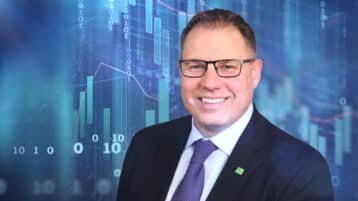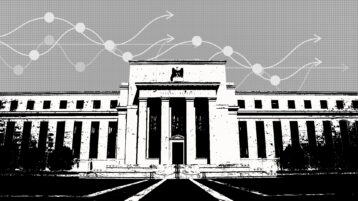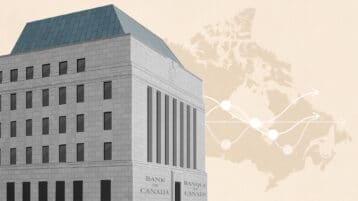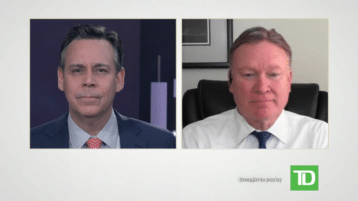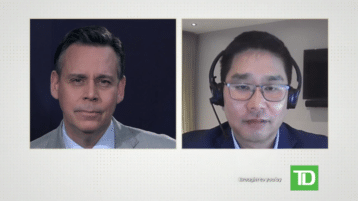Print Transcript
[music] Hello I'm Greg Bonnell and welcome to MoneyTalk Live brought to you by TD Direct Investing. every daily joined by guests from across TD many of whom you'll only see here. We we'll take you through with moving the markets and answer questions about investing. Coming up onto a shell, we will be joined by Michael Craig, head of TD Asset Management to discuss what's happening in the markets with volatility on the rise as investors are facing steep losses this month. Also Nugwa Haruna will discuss how to use the platform on WebBroker…. You can email us at moneytalklive@td.com or Phil at that viewer response box right below your screen here on WebBroker. Before he gets all that let's get you an update on the market action right now. We have some green on the screen. It's pretty modest. A bit of a reprieve from the recent days. Obviously, if you're on the market, you'll probably take it. If the TSX off about 82 points, a little shy of about half a percent. We are seeing some firming in the American benchmark crude prices. We have West Texas intermediate at 78, 61 on my screen. For a gain of about 2 1/2%. Money moving back toward some of the big energy names. Let's check out bait techs and see how it's performing at this hour. At the moment, up a little shy of 5%. Also some money moving towards the materials. The US dollar on a relentless climb higher, taking it of a pause today. You have Kinross and the mining names, four bucks and $0.57 a share. South of the border, let's check on the S&P 500 kind of hanging out there in positive territory up a very modest 2 1/2 points. Let's check in on the tech heavy NASDAQ.and the oil bids are getting, the oil bit names are getting some action south of the border. Let's check on ExxonMobil. X on an 85 bucks and change, up a little more than 2%. And that's a market update. September does have a reputation of being not very kind to the equity markets and we are definitely living that is investors. Of course the key question is "what lies ahead"? Volatility presents opportunities for us. Michael Craig, head of TD Asset Management joins us. How do we see this Michael? >> It's a very challenging backdrop right now. Equities have really repriced the function of the cost of money. What governments are borrowing at. It may come down but probably not as much as they probably need to. On the fixed income side, for 12 years, investors have really been challenged to find sources of income and I think, I read earlier that we went to "there is no alternative" to "there are plenty of alternatives". We are at more attractive levels, particularly in the income space to think about that. So that's kind of where, you know, the thought processes now. The bond selloff is well entrenched, levels of industry, bonds are at very high levels. Levels that typically can break an economy and put it into a recession. So in that area, it's more interesting than perhaps the equity markets. >> Now in some of these areas in the market, people always want some sort of crystal ball to tell them exactly how to make their move. Any efficiency in the market whatsoever, while things look interesting, things could still be tough for a little while? >> So for 12 years, we almost had this Pavlovian response in markets where you had easier, we had these belts of volatility and we had an easier policy. And so the reaction of a lot of investors is to buy. I would be very cautious with that in the sense that that combination is not likely to come anytime soon. Until you are buying into what likely will be a recession. And so I would urge patience. I think that probably make some sense. This bear market that we are in, we are technically in a bear market, will likely be one that is more defined by time than speed of selloff. So probably for a longer period if a bear market than we really experienced prolonged period of time. >> Of course, in the Summer when we had that rally… It seemed to be a bit of doubt among investors that the Fed was serious. Jackson Hole seemed to change that. Jerome Powell actually is serious about all this. At some point, is there an argument to be made where the Fed gets the job done? And eventually there will be rate cuts? For investors, that seems to be the hope that got thrown out with Jackson Hole. >> It will happen. There's a high degree of certainty about that. But it's too early. They have moved from being kind of a forward-looking central bank to really be targeting measures that tend to be lagging. Which is a bit tricky because, forward-looking measures of inflation have their own prices paid. We are seeing a lot of the transportation measures rolling as people are consuming less. Rate hikes have an effect on people's behaviour. But it will take some time to show up in CPI numbers. So I would say just be patient. The Summer rally was the Fed speaking talking about Fed funds being at neutral levels. I don't think that's what Powell meant but that's what investors took. And then you had a lot of, you know, technical analysis saying "we are at these critical levels : history says that the but every time we have bear markets over…" That was really only half the story. So people started buying the narrative of the market. It's the narratives that can kind of push you in different ways. That's the cause of bear market rallies. But I would wait for a bit more of a washout in a real… To get excited about pushing back into equity. >> Could there be more bear traps awaiting us? >> Sometimes this profession mentally, you feel like you're a bit of a kite in the storm. Not to say this is the same, but to look at a previous bear market in the 2007 to 2009 experience, there were a number of rallies and that bear market in the double digits… 15, 20 absent rallies before we ultimately at the bottom. And I think you have to be very disciplined when you are looking for a degree of bottoming. In various other metrics to get comfortable that we are actually at the bottom of that you've seen a policy shift right? Starting to see where inflation is a lot to handle you're getting a feel that central banks are really looking to ease policy again. You will see, the bond market will start to steep in as the front and starts to rally. None of those things are happening at. So, again, I would say that rallies at this point forward, nothing else changing, are bear traps. >> That's a good piece of information to take away from the conversation. What's happening in Britain right now? You have a new prime minister, you have there are new finance ministers and then a pretty violent reaction in the markets to some of the plans they have. Is this one of those : this is the G-7 nation… Do we need to be concerned in North America about what effect that could have and are markets or is it a British problem at the moment question mark >> This is a, I actually think historically, we will look back at this. As one of those moments where the markets went in a completely different direction and the economy is going in a completely different direction that had previously been understood. What I mean by that is, the UK moving forward with a package of tax cuts funded by borrowing. We all of our ideologies and there is an ideology that smaller government… Lower taxes. Okay. But to pay for tax cuts usually shrinks services and there's an ideology where increased taxes increase services. But to go and cut taxes and then say "we are in a finance it with debt at 4%, and think you will be able to cause growth is a very risky strategy. And what you saw was that you can't do that anymore because the monetary buyer is investors. Not central-bank. Investors are saying no. And if you think about it, for a household making $20,000, these tax cuts are about 4 1/2 thousand dollar savings. Sterling is off since it was announced. That household, in terms of US goods, they already lost $14,000. Borrow rates are about 70 to 80 basis points. So epic fail. I think it's a warning to finance ministers that you have to keep in mind the reaction of the bond markets and the policies. Something we haven't had to worry about for years now. I think it's going to really usher in a sea of change and we have to prioritize what needs and wants and focus on those needs. Because the cost of money is much higher than it was a year ago. >> What we are living through right now and so much as happened in 2022 alone. But the greater context is the pandemic. The massive dislocations that we had across all sectors of the economy. Had in the markets… It seems we are living with this hangover for a very long time. >> Yeah. I mean now we are going through a longer term implications of COVID. Long COVID for certain, you know, and even now… We had a recent surge in Ontario. You have absentees and a shortage of labour and an amazing amount of people 55 and over leaving the workforce. So we do truly have work shortages. My sense is though that the behaviour during the pandemic of kind of excessive consumption is now about to reverse. And that all we are talking about today with supply chain challenges and goods consumption is about to reverse across the board. In many ways it'll be weird where you have this very high growing costs but the price of some goods are about to come down. As retire as retailers start discounting excessive inventories. … > Fascinating stuff is always in a great start to the program. We will get to your questions with asset allocation with Michael Craig in just a moment's time. A reminder of course he didn't get in touch with us any time by emailing MoneyTalklive@td.com.or fill out that your response box. And now some new stories. US home prices continued to cool as buyers feel the pressure of higher borrowing costs. While the latest S&P Corelogic Case-Shiller I M ndex shows a nearly 15percent% annual increase in home prices across 10 major US cities in July – that's down from the more than 17% gain booked a month earlier. The report calls that a "forceful deceleration" in housing as the Federal Reserve continues to hike borrowing costs. Shares of Cargojet are in the spotlight today. That as the cargo services company lays out new long-term financial targets for investors. Cargojet is targeting revenue of up to $1.4 billion in revenue in 2026. And it plans to expand its fleet to 51 aircraft over the next 4 to 5 years. Cargojet currently operates a fleet of 34 aircraft and booked $758 million in revenue last year. Hertz is teaming up with oil major BP to build electric vehicle charging stations across the United States. The rental car company will partner with BPs EV charging division, BP pulse, on the project. The news follows on plans for hertz to buy some 340,000 electric vehicles for its rental fleet over the next five years. BP Pulse will install the charging stations and provide the software. And here's how the benchmark index in Canada is trading. We will start here at home on Bay Street with the TSX Composite Index holding onto its gains but they are pretty modest at 18,003 and 41. …We are back now with Michael Craig, Head of Asset Allocation at TD Asset Management. How do you position your portfolio for recession? >>… With inflation still elevated, if we have a recession receipt inflation rollover which is probably a base case, I would expect to see the government do quite well. Government bonds… Why? Today, Canadian rates are 2 1/2%. US rates are 4. That would be one way to think about itI think it's good for investors to put together their shopping list. I was thinking during the break, I think Warren Buffett bought, during the financial crisis bought the S&P 500. He's offside, huge and since then fivefold. Having that kind of list in thinking about what you are looking to target also makes sense. So it argue for a bit more cash. And then, short-term cash right now is yielding North to 3%. So it's not terrible. >> It seems like you mentioned at top of the show but how our every need was being met in past years by, central banks. That game is over. Did it sort of erode our patience as investors? > Well, if you look at the writings of Minsky and the take away as stability breeds instability and stability breeds stability, it's been 12 years. There have been some makeups and some tough periods but historical context has been one of relative calm. I think that today is something that has to be almost unlearned as we enter a period into heightened volatility, even as we go through what will probably be a recession on the other side. My sense is this volatile environment will stay with us for some time. So I would… It's not going to be… You have to, it's not going to be an environment where everything works anymore. And this is where it's going to be a more, you know, the returns from pure beta market exposure I think will be challenged. But there are going to be from the alpha side, you have additional return of a market. Opportunities that will probably be much more prevalent in the next, you know, handful of years then have been in the past. >> Looked into another question right now. You mentioned government bonds and opportunities. Our bonds are GICs a better playwright now? A lot of questions like that on the program. Understandably because people probably take a look at them for the first time in a long time. >> I get asked that question quite a bit. The answer never changes. For short-term needs, you've gotta cash out in six months to one year, GICs make it in a sense. A few things here though. In terms of option alley… Right? Let's just say for whatever reason the market bombs in the next three months. You want to be able to move capital and take advantage of that. If you're locked into a GIC loss of functionality, unless you have penalties to break it so… While the rates in GICs it really tragic right now, the return on equity's, you know, is more attractive today than it was a year ago because of the way the prices are. The five your return on bonds is way more attractive today than five years ago. It just was GICs you know for certain what you're going to get. But for long-term kind of wealth accumulation, you know, it gives you comfort, you are probably giving up some upside. Versus the rest of the class on a view of 3 to 5 years. >> All right. Let's get to another question now. Here's one about central bank policy. Can the bank of Canada diverge from the Fed at some point? >> We think they're going to have to. Because, the interest rates sensitivity of our economy is materially higher in the US then the US rather, because as we know skip housing is become an outside source of our GP. Housing during the rates… So I struggled to see how the bank will keep up with the Fed if the Fed does go to say 4 1/2 which some people are looking for. So you are starting to see the currency markets, the Canadian dollar has sold off materially. Versus the US bonds. But they are still trading at a lower yield than US bonds. I think that's the market telling us that our return rate will be lower as we will probably tip into a recession sooner than the US. >> Can the bank of Canada be on a path to cutting faster than the Fed? Or is this more of a pause. Saying "we have a bit of indecision in our countrymen. Here" or it will they stop for a while? >> I think until you see inflation, inflation is a global phenomenon. It's not just one country. Because of trading. It's hard to see one country having inflation, for other countries are still… I mean you might get some calculations there but I think there will be challenged to be cut until they see inflation back on a two point handle. Same problem with the Fed. It will take some time. The longer they hold rates in a very restrictive setting, the more damage to aggregate demand in the economy will occur. So that's a real delicate balance. You are probably going to see some degree of politics in all jurisdictions unfold as labour market start to soften and you see unemployment, there will be pressures. Lessons from the 1970s. Everyone blames Arthur Burns but he did not have much help. If you think about the UK, if that permeates in other jurisdictions where they say "we will do what we think is popular", they will not be able to cut as fast as they want to. >> Great points indeed. Make sure you do your own research before making any investment decisions. We'll get back to your questions with Michael Craig on market just moments time. A reminder of course did you get in touch with any time by emailing moneytalklive@td.com. Now let's get to educational segment of the day. If you are interested in having a look back at the historical performance of your and investing strategy, WebBroker has tools that can help. Joining us with more is Nugwa Haruna, Senior Client Education Instructor at TD Direct Investing. Nugwa always great to have you with us. If we want to back tester strategy how do we do it? >> The idea for back testing is an investor has a specific investment strategy may be looking to test and see how well that strategy would've performed historically. As well as of the potential returns of that strategy could be in the future. So WebBroker does have this that is built into the screen within WebBroker. So we will hop in now and I will show you how you can utilize the back test feature within the screeners. So once in WebBroker : an investor is able to click on "research". And under "tools", the investor will click on "screeners". That's one of her mobile most popular tools. Instead of the screeners from scratch, we are going to use one that already exists in the system and that is under the "expert strategies". So the company that brings us the screeners tool, they also have experts that create different strategies that you can utilize instead of creating your own screener from scratch. So I'm going to just filter and get some of the most recent strategies they have. We will look at some of the US dividend growth outperformance. We will click on that. So once we come here, you will be able to see the different criteria that has been used and an investor can always edit this if they would like. But based off of this information that we have, on Securities the trade on US exchange, there are 45 matches. So what I will have us do is scroll down. If you are looking to back test, you just want to scroll down below your screen. You will be able to see the back test tool. Now you are able to back test based off of buying and holding the security for three months, selling it and then starting over again. So that is essentially the theory behind back testing and you can do that over a five year range. So you can either do the "buy and hold" system or if you want to sell short you can take that as well. We will stick with the "buy and hold". We are going to calculate. Essentially, what we're doing right now, we will call it US dividends. We are doing right now is we are comparing and looking at the historical performance of this specific screen and its top 10 matches. How they performed based on the strategy of buying, holding for three months, selling and buying again for the last five years. And how that screen performs compares to the S&P 500. Which is an index that tracks 500 largest companies in the United States. Serrated the back, will be scroll down here we will be able to see that this specific portfolio that we have on the screen, in terms of five year return, would've hypothetically given the investor of 54% return as opposed to the return of the S&P 500, which was a 47%. You can also look at a one rip one year return which is 1% as a compares to a -15%. So investors can incorporate this information as they start to make their investment decisions. >> Nugwa, testing our picks against the S&P 500 benchmark makes a lot of sense. Any other options as we can test ourselves? How we can do it? > One of the things we do it is we use the S&P 500 index and you can always change that right? You can actually compare, for instance, that portfolio to the Dow Jones average. Something else will notice as I go through this, I only have US indices. So if you want to incorporate Canadian indices because you are more interested in that, we will scroll up, and notice we only focused on Securities that trade on the… Exchange. So now we can incorporate the Canadian exchange. Or the stocks in trade on the US and Canadian markets. We will click on that. And so our screen is going to reset. Now we have 51 matches. Now we are going to scroll down. I want to take my time. I don't want any whiplash situation here. Now we are back here. But now you're going to notice, we can compare the performance of the top 10 Securities in our screen to the S&P TSX 60 index which is an index of tracks some of the largest 60 companies that trade on the Toronto Stock exchange. So once again, an investor can now recalculate this. In this case I will call it US/Canadian dividends and I'm going to go "okay". So just telling you that you can do multiple different back test by changing the screen results that you have. Just to see how that yield portfolio performs versus the specific index and how that portfolio performs compared to other indices. And now you're able to see with that result looks like. >> Great stuff as always. Nugwa thanks for that. >> Thanks for having me. >> Nugwa Haruna, is the senior Client Education Instructor at TD Direct Investing. Make sure you check out the learning centre at WebBroker for live master classes and upcoming webinars including "how I choose between dividend stocks that fit my investing criteria." We will get back to your questions with Michael Craig. A reminder of how you can get in touch with us: Do you have a question about investing, or what is driving the markets? Send it to us here at MONEYTALK LIVE. You can send your questions two ways: You can send us an email anytime at moneytalklive@td.com. Or you can use the question box at the bottom of the screen right here on Web Broker. Just type it out and click send. We will see if one of our guests can get you the answer you need right here at MoneyTalk Live. We are back now with Michael Craig, Head of Asset Allocation at TD Asset Management taking your questions with the markets. So let's get back to them. Should we still be avoiding big tech stocks? >> So I will speak as an investor on a shorter-term investor, trade or. I would say within a portfolio, you always want exposure to those companies that create kind of, real growth gains. Etc. That typically leads to big tech. I would also say that I would not think as a blob anymore. Again. Start thinking about who's got free cash flow yield growth and who is relying more on concept ideas, etc. Not really any earnings. Be careful about categorizing is one big blob. My sense is they will probably be one of the leaders out of this. But in the short term, the market is still quite expensive they are. Kind of taking out mega capital of the S&P. Underneath, general earnings or maybe 14 times which is maybe not terribly expensive. But when you throw in… Big tech it gets more. So they are still elevated in terms of price. They actually are quite sensitive to rates selling off. So you know, again, are you in a good place in five years? Most likely. But they probably still have some challenges ahead of them and I would be a bit more selective than buying a blob and hoping it all works out. >> That term "the blob". Specifically about earnings, you think about profitable tech. There was this time were people wanted to dive in on those. Maybe not quite as willing right now. >> The way we think and invest, when money is free, all those businesses get funded. When money is at 4 percent, those businesses don't get funded. They are still burning a lot of cash. They might have great ideas but you have to really worry about and understand where their sources are capital are going to come from. I think that's the biggest risk for some of those companies. so you have to be thoughtful about who survives this. There will be companies that disappear going through the spirit of time. >> Let's get another question right now. I like your comments rather I would like your comments on rate resets preferred. When you think about the space? >> We don't typically invest in the space but a few comments. One, from a yield play, it makes a lot of sense. Again,make sure the companies you hold can withstand those higher rates. You make it into some financial distress so make sure you have other sources of funding. I would say that, again. I would make never make a broad cost of the whole spectrum whose for companies whose only financing : for this I would be a little leery. It's probably okay… Last thing, if the market sells off, your actual value, your valuables will fall. But if you are okay with that volatility for a yield then that should be fine. >> Another caveat in that space. Another question: will US dollar strength be a major headwind to earnings? >> Yes. 100%. We are talking what US stocks of course. But absolutely. 40% S&P earnings from overseas. Sterling on its way. The Canadian dollar is actually a standout this year. Relatively speaking, we are in good shape. There's no question that the current earnings estimates are not going to be anywhere near reality as we go to the end of the year and start seeing things marked down and expectations for 2023. >> You mentioned the loony there. Somebody is asking what the loony outlook obviously, with the US dollar charging through everything. There is a consequence for our currency. >> So we are in a period right now as I will stress, last week, US US treasuries get crushed with 20 basis points basically on the back of the intervention. A lot of things right now. Look at them in thinking what's going on? It's really distressed in the market. As long as it doesn't seep into the US dollar… Again, the lesson from the early 80s is on a fundamental basis the US dollar is grossly overvalued. But it doesn't mean that it doesn't stop here. So for longer-term investors, I would expect the Canadian dollar to appreciate from these levels. But I would not be stepping in front of a moving bus right now. Yesterday was one of those days where you can start to see the makeup of the markets starting to shift and more different categories of players started going more along the dollar versus CAD. So probably, as an earlier question about recession strategies, you know, one strategy that has typically worked is… Up to the point where you get the singles that the Fed will be about to turn out. Once it turns, you have to be quick. … > Fascinating stuff. We will get back to your questions with Michael Craig. As always make sure you do your own research before making any investment decisions and a reminder that you can get in touch with us any time. Do you have a question about investing, or what is driving the markets? Send it to us here at MONEYTALK LIVE. You can send your questions two ways: You can send us an email anytime at moneytalklive@td.com. Or you can use the question box at the bottom of the screen right here on Web Broker. Just type it out and click send. We will see if one of our guests can get you the answer you need right here at MoneyTalk Live. Corporate borrowing is increased over the last few years as low interest rates and government support programs encourage firms to take on debt. With the swift rise in interest rates along a slowing economy has raised concerns about company's ability to service their debts. Anthony Okolie joins us now with more. >> Interest rates along with a slowing economy has raised the fears about corporate rather corporations abilities to service their debt. And corporate borrowing costs have rise to. Now the interest coverage ratio, the ratio earnings to interest costs is evident across industries. The highest level since 1967. The increase in interest, the ICR, firms have added financial capacity to meet that obligation in the event of an economic downturn. Now still, TD economics says that some industries are more vulnerable to downturn as this current graph shows. If you look at the green diamonds, it represents the average earnings for each sector. Over the last 30 years. +2 additional standard deviation shots. You can see which sectors are likely to see the biggest swings in the ICR in the event of a recession. Because of the highest volatility earnings, energy, material, consumer discretionary, telecom sectors could decline in interest in of event of a recession. However TD economics says that the good news is over the past two years, corporate profits and cash holdings have outpaced debt growth. Providing an additional buffer for companies to ride out the storm. Greg? >> What about what it means for the leverage loan market? > The leverage loan market certainly faces… With TD economics. This word debt is variable. It rises and lock in step with the federal funding rate. This will add great challenges for borrowers over the next year. TD economics says that this market is relatively small versus the overall level of corporate debt and the vast majority of corporate debt is long-term with not more than three years. That means the impact of this rising interest rate environment will be relatively small for most companies at least over the next two years. >> Thanks always Anthony. > My pleasure. >> MoneyTalk Live Anthony Okolie. Let's check in on the market. Some moderate strength but it is fading. You have the TSX just lying flat. We want to check out how the energy plays are doing because West Texas intermediate, not quite as high as it was this session. Still in positive territory. We see some of these names still to the upside, Crescent Point Energy among them. About 3.7%. Some of the mining names to let's check in on those. Some strength there as well. 6 1/2 bucks. So what's holding us back? I actually do want to do a quick check on the sectors noticing weaknesses. The TSX's and utilities, financials, industrials, technology and healthcare. All negative at the hour. South of the border, let's check in the S&P 500. We had a little green on the skin at the start of the day. A bit of a reprieve but it is turned on us. So what is not working is still getting a bid but it is the utilities. Some consumer goods stocks and the financials. What is it mean for NASDAQ? Let's check in and see how it's very right now. About down about half a percent. NVIDIA still hanging in positive territory but not to the same degree from the start of the show. We are back now with Michael Craig, head of TD Asset Management. When does gold become attractive? >> I have not had the great understanding of a gold this year. > I have not understood goal this year. >> With this rise in interest rates tends to be a headwind for precious metals and gold. Like most currency, gold is a currency has followed other currencies with a strong US dollar. So if you things: number one, if the US dollar is experiencing a fever right now in terms of going higher, you want to see that favour break. There will be support for gold. Really interest rates coming off which will ultimately come when you get a degree of easing indications for gold. But I think it still makes sense in the portfolio because… We are kind of in uncharted territory right now. We have global debt at all time high. Industries are cracked up right now and we are not sure what to happen. Technically, in times of chaos, gold is okay. It's not a perfect portfolio hedge. It works sometimes. Small allocation probably makes sense but that's an area where it has been a really challenging year for gold and a frustrating one to boot. > Most definitely. Okay let's get to another question on the platform. How long you think inflation will take before we get down to three or 4%? So the sweet spot about… >> An example I would use is, if you are trying to lose weight, the first 5 pounds are usually easy. The last 5 pounds of the hardest. Getting down from 8 to 6 or 8 to 5 is going to be pretty quick. You will probably see that in the year. Getting down to to handle because of the way inflation is calculated, because there is some lagging particularly in the rental calculations, it's going to take some time. I would not expect to see Goldbach or CPI back on it to handle until probably next Summer or later next year. Again, if we had a severe recession starting today, we would be down quicker. But my sense is it will take some time. You are seeing commodities off. Oil is down. >> Lumber has fallen down to its pre-pandemic after a massive surge. >> Oil, we see prices at the pump coming down so we have some leaning indicators but are around, rent tends to be sticky, wages tend to be sticky. I will take some time. Middle of next year to the summary will probably see some better ratings. But still a ton of uncertainty. It wouldn't be the first time I'm wrong on something and it definitely will be the last but my expectation would be next June of next Summer. >> You should like this next question then. What keeps you up at night? What doesn't keep me up at night personally these days? >> I try to sleep as well as I can. These days, you're so exhausted not a lot of problems sleeping. But I would say two issues. The reason I say this is there is really a degree of certain uncertainty. No idea how this plays out. Number one: we have gone through a period of tremendous calm when we think about conflict. That is breaking down. So I do worry that we are living more and more in a world where we have conflict and we get hot conflict. Particularly in Taiwan. So that is a bit of a wildcard. I just don't know. And I know that would be quite unsettling if you saw what happens there. The other is, essentially, it's just kind of waiting to see. We have this huge lift in overnight rates and the reaction is always delayed. Same with that reaction is, is I think quite unsettling. How are households going to respond to this? Particularly in our country, it's about labour. So if the labour market kind of holds and softens a little bit, not too bad, then we will probably see house prices down 25% which gets you back to pre-COVID. It doesn't feel good if you but of the highs but as an aggregate, not the end of the world. But if we do see unemployment take higher, people starting to force cell, that could be problematic. Those are the two things where I would say I have the highest degree of concern. And it's really, not because I think it could happen, but you know, as it said, deuces are wild. What could happen next customer those are the two things I struggle with. > Michael. Always a pleasure to have you here and get your insight. >> You're welcome. >> Our thanks to Michael Craig, Head of Asset Allocation at TD Asset Management. And stay tuned on Wednesday, Greg Barnes, Managing Director at TD Securities we are just taking your questions about mining stocks. And a reminder they can get a head start by emailing moneytalklive@td.com. That's all the time we have thanks for watching and see you tomorrow. [music]














